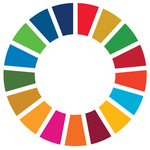
PharmaSafe's research related to the United Nations' Sustainable Development Goals
In 2015, The United Nations' (UN) member states agreed to 17 global Sustainable Development Goals (SDGs) to end poverty, protect the planet and ensure prosperity for all. Researchers in the PharmaSafe research group contribute towards the following goals:

- SDG 3: Good health and well-being
- SDG 5: Gender equality
- SDG 9: Industry, innovation and infrastructure
- SDG 10: Reduced inequalities
- SDG 17: Partnerships for the goals
Our goal is to perform high-quality innovative research that has the potential to improve how medicines are used throughout patients' lives and is therefore of great importance to society. This is in line with SDG 3: "Ensure healthy lives and promote well-being for all at all ages". As many of our projects focus on medication use in pregnancy for the mother and child, subgoal 3.1 (to reduce maternal mortality) is particularly relevant. Moreover, our research is in line with SDG 5, as it will reduce the current inequality between men and (pregnant) women regarding knowledge about the use and safety of medicines. Diseases mostly affect deprived pregnant women and knowledge about safer pharmacological treatment may thus be most beneficial to deprived women, thereby helping to reduce sociodemographic inequalities (SDG 10). Developing platforms and methods to enable analyses on sensitive health data to be transparent, reproducible and FAIR, is in line with SDG 9 (sustainable innovation and infrastructure). Last bot not least, the transdisciplinary nature of our research is in line with SDG 17; everything is interlinked and we need to work together to ensure a sustainable use of medicines today, to enable future generations to have access to safe and effective pharmacological treatments.
KD-positions earmarked for sustainable development
The KD-positions are PhD and postdoctoral positions that are funded as part of our basic grant from the Ministry of Education and Research. PharmaSafe's Angela Lupattelli was awarded funding from The Sustainability Initiative for her project "Understanding the effect of drug exposure in mother-father-child triads on cardio-metabolic dysfunctions in youth". Read more here.
The impact of environmental factors on medication use, effectiveness, and safety
Climate change with more extreme weather in the form of rainfall, floods, heat waves and droughts will have an impact on our health, and thus the population's need for medicines. Extreme weather in the form of heat waves poses a particular health risk for the weakest in society such as pregnant women, newborns, the elderly and the chronically ill. Climate change can also affect mental health. Overall, climate change could affect the population's need for and use of a number of medicines. In climate health analyses, it is important to consider a wide range of data sources, including epidemiological data, environmental assessments and health impact assessments. In future studies we will investigate whether pharmacoepidemiological statistics can be used as additional data to understand the wider consequences of climate change for public health.